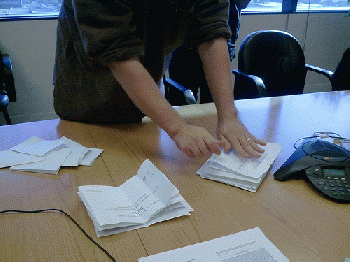Referring to hacking of elections, US Senator Angus King IND of Maine recently commented "everybody says that cyber is going to be the next Pearl Harbor"This is the longest windup for a punch in world history, and yet we're not fully prepared."
Washington has recently allocated $380 million to the states for election security, far less than the $3.6 billion Congress allocated in 2002 to replace voting machines.
With inadequate help from Washington, it's up to the states to protect the vote count from hacking by Russia or others
If New York is any indication, the states have a lot of work to do. And quickly. New Yorkers vote on paper ballots counted by computerized scanners but candidates can't get recounts and there are no hand counts even in very close elections. New York might as well be using the infamous touchscreen voting machines that can fail or switch votes in secret.
New York has paper ballots, but they are never 100% counted-- even if a candidate loses by one vote.
Most New Yorkers believe we have hand recounts because we have seen paper ballots being counted and fought over after close elections. But those ballots are only the handful of provisional or absentee votes whose validity is contested. With the exception of New York City and Ulster County, there is no mandated automatic hand recount of all the ballots even if there is a very close vote. Last November, a Saratoga County ballot initiative failed by only ten votes. As in all previous cases, supporters had to go to court. As in all previous cases, a judge denied a recount.
New York's audit of 3% of the ballot boxes after each election is inadequate to catch hacking
A 3% audit is statistically inadequate to find fraud. New York hand counts ballots in 3 out of every 100 ballot boxes. The ballots in the other 97 ballot boxes sit unexamined in a warehouse for 22 months before being discarded. If the ballot count doesn't match the machine count, an audit can escalate to 100% of the ballots, but only if both the Democratic and Republican election commissioner agree to do so. Such an escalation has never happened. A commissioner whose party's candidate is ahead on election night is highly unlikely to agree to count more votes.
Election officials insist that ballot scanners are not connected to the internet so they can't be hacked- but they can
Ballot scanners are just as easy to hack as touchscreen machines. For example, ES&S DS200 optical scanners used in New York, Wisconsin and elsewhere can be equipped with modems. Optical scanners use memory cards that can be programmed without detection to add or subtract votes. The New York Times reports. "..a hacker could subvert telecom routers to intercept and alter election results as they pass through telecom equipment".
At the annual DefCon computer security conference in 2017, hackers unfamiliar with voting machines easily hacked all thirty voting machines examined, including scanners.
Susan Greenhalgh, a spokeswoman for the National Election Defense Coalition, an elections integrity group said ''The incorrect assertion that voting machines or voting systems can't be hacked by remote attackers because they are 'not connected to the internet' is not just wrong, it's damaging. This oft-repeated myth instills a false sense of security that is inhibiting officials and lawmakers from urgently requiring that all voting systems use paper ballots and that all elections be robustly audited.''
(Note: You can view every article as one long page if you sign up as an Advocate Member, or higher).





